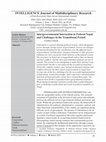Papers by Girdhari Subedi

INTELLIGENCE Journal of Multidisciplinary Research
Federalism is a power-sharing political system, which designates power through various layers of ... more Federalism is a power-sharing political system, which designates power through various layers of government. Powers are delegated and decentralized by the constitution over the different layers of government. In federalism, intergovernmental or inter-province relations are very crucial for better delivery of the federal system. The provinces in Nepal are at loggerheads and as they are facing internal conflicts, and the inter-governmental relations are not so smooth. The provinces are attempting to make their internal cooperation better but this is not achieved due to political transition. Given this complex context, poor intergovernmental relations and conflicts between the three layers of government in Nepal have become one of the key challenges for the successful implementation of federalism. Limited knowledge, short experience with federalism and lack of legal and policy issues have created these gaps. The contexts have further jeopardized inter-governmental relations. Weak inter...
Conflicts and contradiction in society is arise when rule is override..From the very beginning th... more Conflicts and contradiction in society is arise when rule is override..From the very beginning the ideological conflicts and structural contradiction between SPA and the Maoist took over the issues on armies arms , monarchy integration and rehabilitation of combatants and democratizing the parties etc. The beneficiary groups stood on status whereas the other stood out right approach .Party self interest become a problematic to reach consensus on a numbers of issues, despite repeated commitment to liberal democracy. To establish ideology , identity and legitimacy electoral engineering became the main obstacle to all

In pursuit of the quality education, from the academic session 2018, Tribhuvan University (TU) la... more In pursuit of the quality education, from the academic session 2018, Tribhuvan University (TU) launched the semester system, replacing the annual system in the postgraduate level to all its constituent and affiliated campuses across the country. As a constituent campus of TU, Prithvi Narayan Campus has started the new academic year under the semester system in all master’s degree programs. Implementing the semester system itself is not sufficient to attain quality education. It needs some basic requirements for its successful operation in place of the old annual system that was presumed to fail in delivering quality education. Full-time students, professional teachers, applied and innovative curriculums, scientific teaching methods, a resourceful library, a learning environment and a prompt academic calendar are essential requirements for a well-functioning semester system. To find out the perceptions and evaluations of the postgraduate students on some of the basic requirements of ...
Journal of Political Science
On 17th September 2021 the Editorial Board of the Journal of Political Science agreed to retract ... more On 17th September 2021 the Editorial Board of the Journal of Political Science agreed to retract the article ‘Interprovincial Relations in Formative Phase of Federal Nepal’ published in Journal of Political Science, Vol.21 pages 9-18 (DOI: https://doi.org/10.3126/jps.v21i0.35259 ) because the article was found to have significant overlap with other published sources. See retraction notice DOI: https://doi.org/10.3126/jps.v21i0.39813

Journal of Political Science
The objective of this article is to answer the state of provincial states and the challenges face... more The objective of this article is to answer the state of provincial states and the challenges faced by them, and to show the constitutional provisions for coordination, cooperation and coexistence of inter-provincial relations of Nepalese new federal set up. The provincial governments are facing lots of challenge including resource, proper policies, devolution of power and bureaucratic accountability and lack of intra-provincial coordination. The constitution stands on tri-pillar theory (cooperation, coexistence and coordination) to operate the holding together federalism in Nepal. In this article, an empirical facts and field observation of Gandaki Province have been analyzed. The writer argues that other provinces throughout the country have been facing the similar kinds of problems. During the writing, the facts were collected by inter and intrapersonal relations with the civil servants, provincial assembly members and various interaction programs with provincial stakeholders. But...

Journal of APF Command and Staff College
What is the present state of democracy among the Asian countries that were (re)democratized durin... more What is the present state of democracy among the Asian countries that were (re)democratized during the third wave of democratization? What makes the differences? Why some specific factors play prominent role on the deepening of democracy among them? These are the primary questions of this study. The findings from ten young Asian democracies are as follows. First, all the Asian countries that (re)democratized during the third wave of democratization are practicing democratic system at present. Six of them experienced the breakdowns, while four remain as a continuous democracy. Second, out of eleven structural and institutional factors, examined in this research, only the presidential system has clearer positive impact and economic development has a partial effect on the deepening of democracy. Indirect dictatorship or dominancy of family politics in the parliamentary democracies is found as main reason for the perils of parliamentarism among young Asian democracies.
Journal of Political Science







Uploads
Papers by Girdhari Subedi